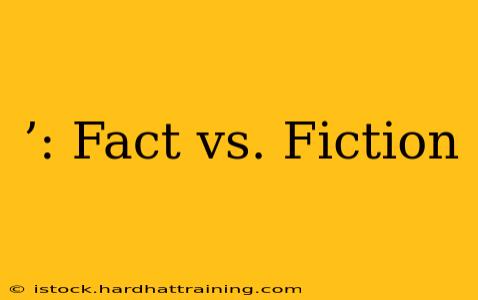The ability to discern fact from fiction is more crucial now than ever before. In an age of misinformation, deepfakes, and carefully crafted propaganda, critical thinking skills are paramount. This article will explore the challenges of identifying truth, highlight common methods used to spread falsehoods, and offer strategies to become a more discerning consumer of information.
How is Fact Different from Fiction?
At its core, the difference between fact and fiction lies in verification. Facts are statements that can be proven true through objective evidence. This evidence can come from reputable sources, verifiable data, or repeatable experiments. Fiction, on the other hand, is created from imagination, speculation, or deliberate falsehoods. While fiction can be entertaining and insightful, it's not intended to represent reality. The key distinction lies in the intent and the ability to substantiate the claim.
What are Some Common Ways Fiction is Presented as Fact?
Many methods are employed to deceive audiences and present fiction as fact. These include:
- Misinformation: The unintentional spreading of false information. This can stem from honest mistakes, misunderstandings, or a lack of thorough fact-checking.
- Disinformation: The intentional spreading of false information, often with malicious intent. This is a deliberate attempt to manipulate public opinion or cause harm.
- Propaganda: Information, often biased or misleading, used to promote a particular political cause or point of view.
- Clickbait: Sensational headlines or thumbnails designed to entice clicks, often leading to unreliable or misleading content.
- Deepfakes: AI-generated videos or audio recordings that convincingly portray someone saying or doing something they never did.
How Can I Tell the Difference Between Fact and Fiction Online?
Navigating the digital landscape requires a healthy dose of skepticism and critical thinking. Here are some key strategies:
- Check the Source: Is the information coming from a reputable news organization, academic institution, or government agency? Be wary of anonymous sources or websites with a history of spreading misinformation.
- Look for Evidence: Does the information provide credible evidence to support its claims? Are there citations, links to original sources, or data to back up the assertions?
- Consider the Context: What is the overall tone and purpose of the information? Is it trying to persuade you of something, or is it presenting objective facts?
- Cross-Reference Information: Don't rely on a single source. Check multiple reputable sources to see if they corroborate the information.
- Be Aware of Bias: Everyone has biases, and even reputable sources can unintentionally present information in a biased way. Be aware of potential biases and consider multiple perspectives.
What are the Consequences of Believing Fiction?
The consequences of believing fiction can be significant and far-reaching. These can include:
- Misinformed Decision-Making: Incorrect information can lead to poor decisions in various aspects of life, from personal choices to voting decisions.
- Erosion of Trust: A widespread lack of trust in information sources can undermine social cohesion and democratic processes.
- Spread of Harmful Ideas: False information can spread harmful ideologies, leading to discrimination, violence, or other negative consequences.
- Damage to Reputation: Individuals and organizations can suffer reputational damage from false accusations or misleading information.
How Can I Protect Myself From Misinformation?
Developing a healthy skepticism and employing critical thinking skills are crucial in combating misinformation. Stay informed about current events, but be vigilant in evaluating the information you encounter. Use fact-checking websites, compare information from multiple sources, and always question what you read or hear.
What are Some Fact-Checking Resources?
Numerous organizations are dedicated to fact-checking and combating misinformation. While a comprehensive list is beyond the scope of this article, researching reliable fact-checking websites specific to your region will greatly enhance your ability to discern fact from fiction.
By becoming a more informed and discerning consumer of information, we can all contribute to a more accurate and trustworthy information ecosystem. The ability to distinguish fact from fiction is not just a skill; it's a responsibility in the modern world.
